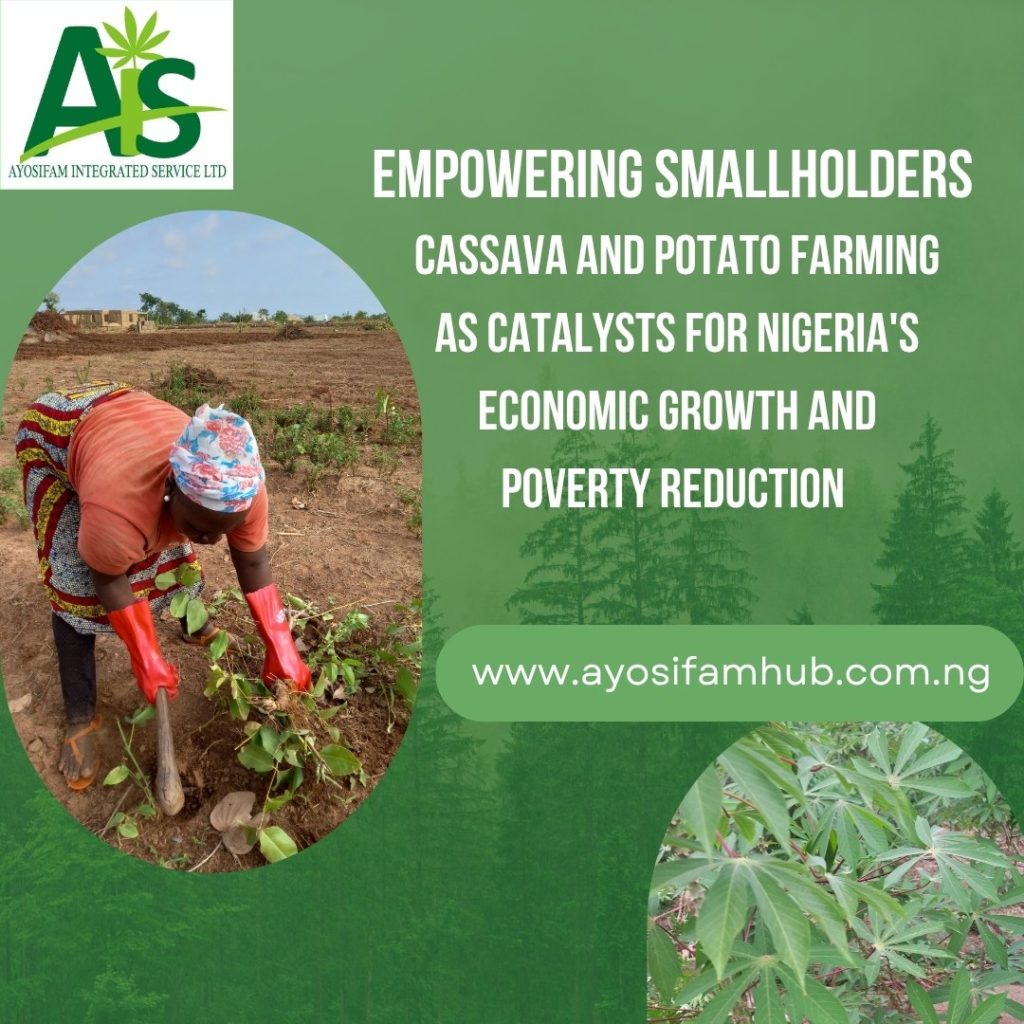Nigeria’s ambitious goal of achieving a $1 trillion economy by 2030 necessitates a multi-pronged approach, with agriculture playing a pivotal role. Within this sector, targeted government support for smallholder farmers, particularly those engaged in cassava and potato cultivation, holds immense potential for economic expansion and poverty alleviation. With their versatility, resilience, and potential for value addition, these crops can become powerful engines for rural development and contribute significantly to the nation’s economic aspirations.
Currently, a significant portion of Nigeria’s agricultural output comes from smallholder farmers who often face numerous challenges, including limited access to improved inputs, inadequate infrastructure, insufficient financing, and a lack of market linkages. Addressing these constraints through strategic government intervention can unlock the vast potential of cassava and potato farming.
Cassava: A Staple with Untapped Potential
Cassava is a staple food crop for millions of Nigerians and a crucial raw material for various industries, including food processing (garri, fufu, cassava flour), starch production, and even biofuel. Government support in this sector could focus on:
Improved Varieties and Agronomic Practices: Investing in research and development to promote high-yielding, disease-resistant cassava varieties and disseminating information on best farming practices can significantly increase productivity. Extension services, coupled with demonstration farms, can facilitate the adoption of these advancements by smallholder farmers. For instance, introducing varieties with higher starch content can boost the efficiency of processing industries.
Access to Finance and Inputs: Providing affordable credit facilities and subsidizing the cost of essential inputs like fertilizers and improved seedlings can empower farmers to expand their operations and adopt modern farming techniques. Innovative financing models tailored to the needs of smallholders, such as cooperative lending or mobile-based credit, can be particularly effective.
Infrastructure Development: Investing in rural infrastructure, including better road networks and storage facilities, is crucial for reducing post-harvest losses and facilitating market access. Efficient transportation systems will enable farmers to sell their produce at competitive prices, while adequate storage can prevent spoilage and ensure a stable supply of raw materials for processing industries.
Value Chain Development and Processing: Government support for establishing and upgrading cassava processing facilities in rural areas can create employment opportunities and increase the value of the crop. Incentivizing private sector investment in gari processing plants, starch factories, and other cassava-based industries will not only boost economic activity but also provide a stable market for smallholder farmers. For example, supporting the development of high-quality cassava flour for use in bread and confectionery can reduce reliance on imported wheat.
Potato: A Nutritious Crop with Growing Demand
Potatoes, both Irish and sweet potatoes, are nutritious and versatile crops with increasing demand in urban centres and potential for export. Government support for potato farming can focus on:
Quality Seed Production and Distribution: Ensuring access to high-quality, disease-free potato seeds is fundamental for achieving good yields. Government investment in seed multiplication centres and efficient distribution networks will be critical. Promoting the cultivation of improved varieties adapted to local conditions can enhance productivity and resilience.
Pest and Disease Management: Providing training and resources for effective pest and disease management is essential for minimizing crop losses. Integrated pest management strategies and early warning systems can help farmers protect their yields and ensure the quality of their produce.
Market Linkages and Storage Solutions: Facilitating linkages between potato farmers and processors, as well as providing access to cold storage facilities, can help stabilize prices and reduce post-harvest losses. Establishing market information systems can also empower farmers to make informed decisions about when and where to sell their produce.
Processing and Value Addition: Supporting the development of potato processing industries, such as the production of potato chips, fries, and potato flour, can create new markets for farmers and add value to their crops. Encouraging investment in small-scale processing units in rural areas can generate employment and boost local economies.
Synergistic Impact on Economic Growth and Poverty Reduction
Strategic government support for cassava and potato smallholder farmers will have a significant multiplier effect on the Nigerian economy. Increased productivity will lead to higher incomes for farmers, boosting rural economies and reducing poverty. A stable supply of raw materials will fuel the growth of agro-processing industries, creating jobs and contributing to the nation’s GDP. Furthermore, reduced reliance on imported food products will save valuable foreign exchange.
By 2030, well-supported cassava and potato farming can contribute substantially to achieving a $1 trillion economy through:
Increased Agricultural Output: Higher yields and expanded cultivation areas will directly contribute to the agricultural sector’s contribution to GDP.
Growth of Agro-Allied Industries: A thriving cassava and potato sector will stimulate the growth of processing industries, transportation, and other related businesses.
Job Creation: From farming and processing to marketing and distribution, significant employment opportunities will be generated across the value chains.
Export Potential: With increased production and quality improvements, Nigeria can tap into regional and international markets for cassava and potato products.
Simultaneously, targeted support will directly address poverty by:
Increasing Farm Incomes: Higher yields and better market prices will improve the livelihoods of smallholder farmers and their families, lifting them out of poverty.
Creating Rural Employment: The expansion of processing industries and related activities will provide off-farm employment opportunities in rural areas.
Improving Food Security: Increased production of staple crops like cassava and potato will enhance food security at the household and national levels.
In conclusion, strategic and sustained government support for smallholder farmers engaged in cassava and potato cultivation is not merely an agricultural intervention; it is a crucial pathway towards achieving Nigeria’s ambitious $1 trillion economy goal and significantly reducing poverty by 2030. Addressing the key challenges faced by these farmers and fostering the development of robust value chains, the government can unlock the immense potential of these crops to drive economic growth, create jobs, and improve the livelihoods of millions of Nigerians. This requires a holistic approach encompassing research and development, access to finance and inputs, infrastructure development, and the promotion of processing and market linkages. Investing in these smallholders is investing in the future prosperity of Nigeria.




